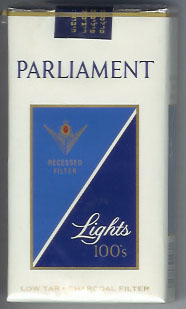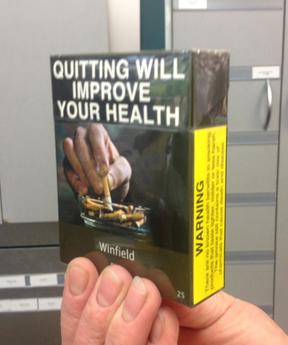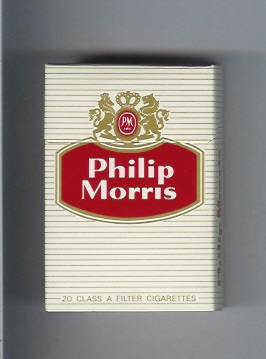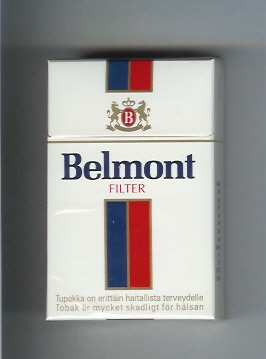
Marlboro is an American brand of cigarettes owned and manufactured by Philip Morris USA within the United States and by Philip Morris International outside the US except Canada where the brand is owned and manufactured by Imperial Tobacco Canada. Marlboro's largest cigarette manufacturing plant is located in Richmond, Virginia.

Parliament is an American brand of cigarettes, currently owned and manufactured by Philip Morris USA in the United States and Philip Morris International outside of the United States.
Benson & Hedges is a British brand of cigarettes owned by American conglomerate Altria. Cigarettes under the Benson & Hedges name are manufactured worldwide by different companies such as Rothmans, Benson & Hedges, Philip Morris USA, British American Tobacco, or Japan Tobacco, depending on the region. In the UK, they are registered in Old Bond Street in London, and were manufactured in Lisnafillan, Ballymena, Northern Ireland, before production was moved to Eastern Europe in 2017.
Tobacco package warning messages are warning messages that appear on the packaging of cigarettes and other tobacco products concerning their health effects. They have been implemented in an effort to enhance the public's awareness of the harmful effects of smoking. In general, warnings used in different countries try to emphasize the same messages. Warnings for some countries are listed below. Such warnings have been required in tobacco advertising for many years, with the earliest mandatory warning labels implemented in the United States in 1966. Implementing tobacco warning labels has been strongly opposed by the tobacco industry, most notably in Australia, following the implementation of plain packaging laws.

Rothmans, Benson & Hedges Inc. (RBH) is a Canadian manufacturer and distributor of tobacco products. It was formed by the merger of the Canadian units of Rothmans International and the Benson & Hedges brand – owned by Philip Morris.

Silk Cut is a British brand of cigarettes, currently owned and manufactured by Gallaher Group, a division of Japan Tobacco. The packaging is characterised by a distinctive stark white packet with the brand name in a purple, blue, red, silver, white or green square.

Winfield is an Australian brand of cigarettes, currently owned by multinational company British American Tobacco. Cigarettes are manufactured and imported by British American Tobacco Australia (BATA), a subsidiary of British American Tobacco.

Philip Morris International Inc. (PMI) is an American multinational tobacco company, with products sold in over 180 countries. The most recognized and best selling product of the company is Marlboro. Philip Morris International is often referred to as one of the companies comprising Big Tobacco.

A pack or packet of cigarettes is a rectangular container, mostly of paperboard, which contains cigarettes. The pack is designed with a flavor-protective foil, paper or plastic, and sealed through a transparent airtight plastic film. By pulling the "pull-tabs", the pack is opened. Hard packs can be closed again after opening, whereas soft packs cannot.

Regulation of tobacco by the U.S. Food and Drug Administration began in 2009 with the passage of the Family Smoking Prevention and Tobacco Control Act by the United States Congress. With this statute, the Food and Drug Administration (FDA) was given the ability to regulate tobacco products.

Plain tobacco packaging, also known as generic, neutral, standardised or homogeneous packaging, is packaging of tobacco products, typically cigarettes, without any branding, including only the brand name in a mandated size, font and place on the pack, in addition to the health warnings and any other legally mandated information such as toxic constituents and tax-paid stamps. The appearance of all tobacco packs is standardised, including the colour of the pack.

Cigarette packets in Australia have undergone significant changes. Since 1 December 2012, all forms of branding logos, colours, and promotional texts are banned from cigarette pack designs. In turn they were replaced with drab dark brown packets and graphic images of smoking-related images to try to reduce the smoking population of Australia to 10% by 2018 from 15% in 2012.

The Philip Morris v. Uruguay case was an investor-state dispute settlement case initiated on 19 February 2010 and concluded on 8 July 2016, in which the multinational tobacco company Philip Morris International (PMI), whose head office is located in Lausanne, lodged a complaint against Uruguay that was resolved by international arbitration under the auspices of the International Centre for Settlement of Investment Disputes (ICSID).

Canadian Classics is a Canadian brand of cigarettes, currently owned by Philip Morris International, and manufactured by its subsidiary Rothmans, Benson & Hedges
"Tobacco" is a segment of the HBO news satire television series Last Week Tonight with John Oliver about the tobacco industry. It first aired on February 15, 2015, as part of the second episode of the series' second season. During the eighteen-minute segment, comedian John Oliver discusses tobacco industry trends and practices.

Peter Stuyvesant is a brand of cigarettes currently owned by British American Tobacco and manufactured by the American Cigarette Company. In Australia and New Zealand, the brand is manufactured by Imperial Tobacco. The cigarette brand is named after Petrus Stuyvesant, Director General of New Netherland, later New York State, New Jersey, Delaware and parts of surrounding states.

Philip Morris is an American brand of cigarettes, currently owned by Philip Morris International. Cigarettes are manufactured by the firm worldwide except in the US, where Philip Morris USA produces tobacco products.

Belmont is a Canadian brand of cigarettes, currently owned and manufactured by Philip Morris International (PMI) in most parts of the world.

As nicotine is highly addictive, marketing nicotine-containing products is regulated in most jurisdictions. Regulations include bans and regulation of certain types of advertising, and requirements for counter-advertising of facts generally not included in ads. Regulation is circumvented using less-regulated media, such as Facebook, less-regulated nicotine delivery products, such as e-cigarettes, and less-regulated ad types, such as industry ads which claim to discourage nicotine addiction but seem, according to independent studies, to promote teen nicotine use.

Iqos is a line of heated tobacco and electronic cigarette products manufactured by Philip Morris International (PMI). It was first introduced in November 2014 in Japan and Italy. Most of the IQOS products are devices that heat tobacco without burning it.

















